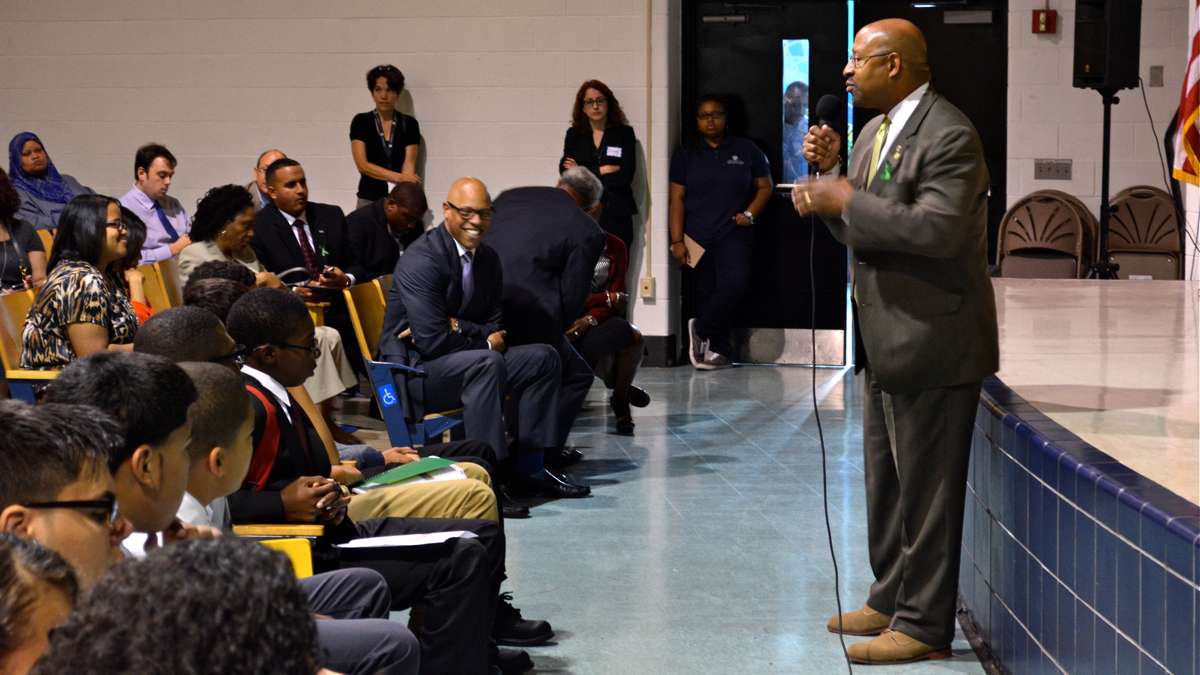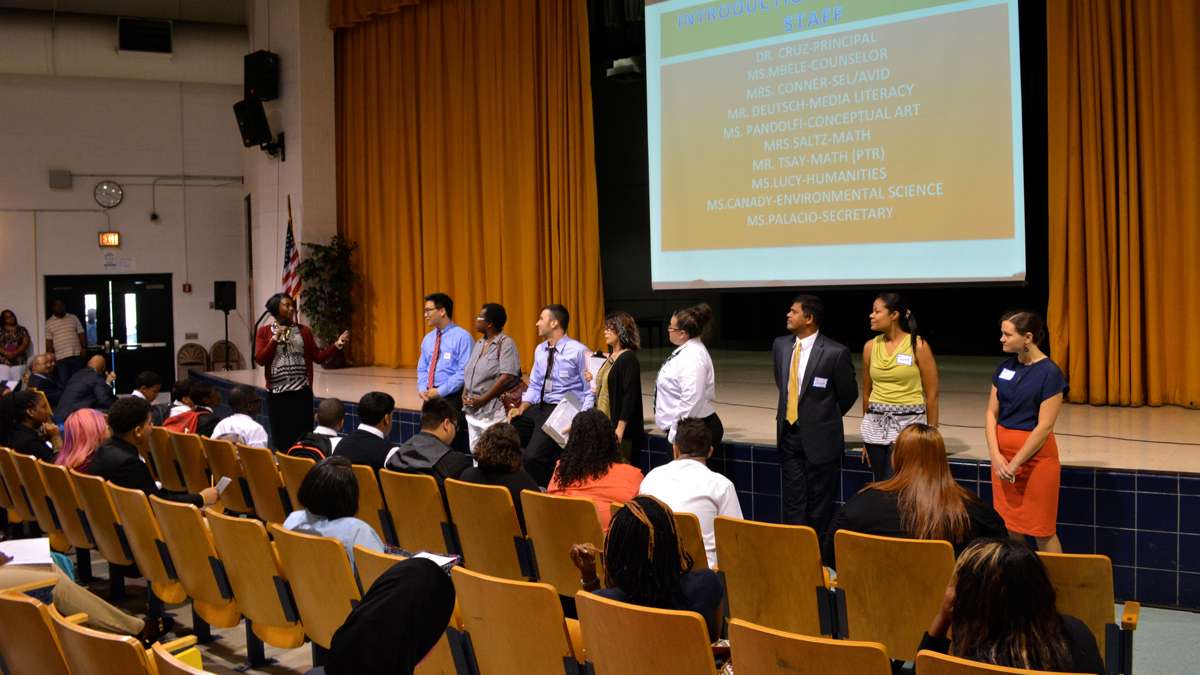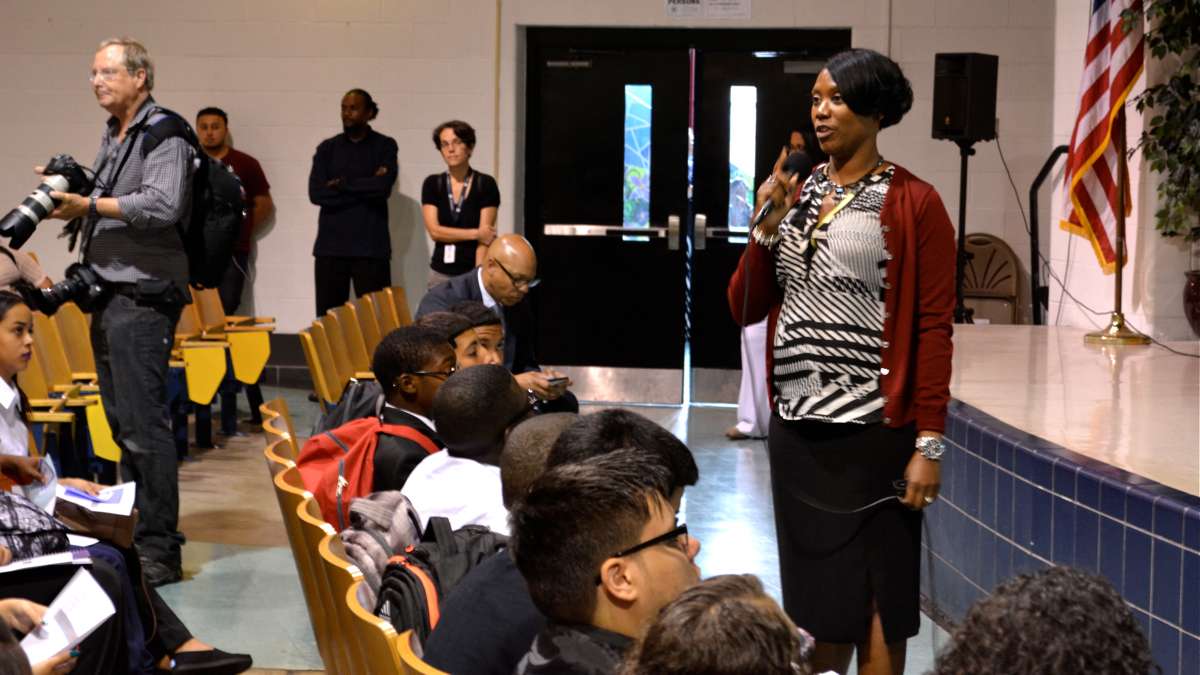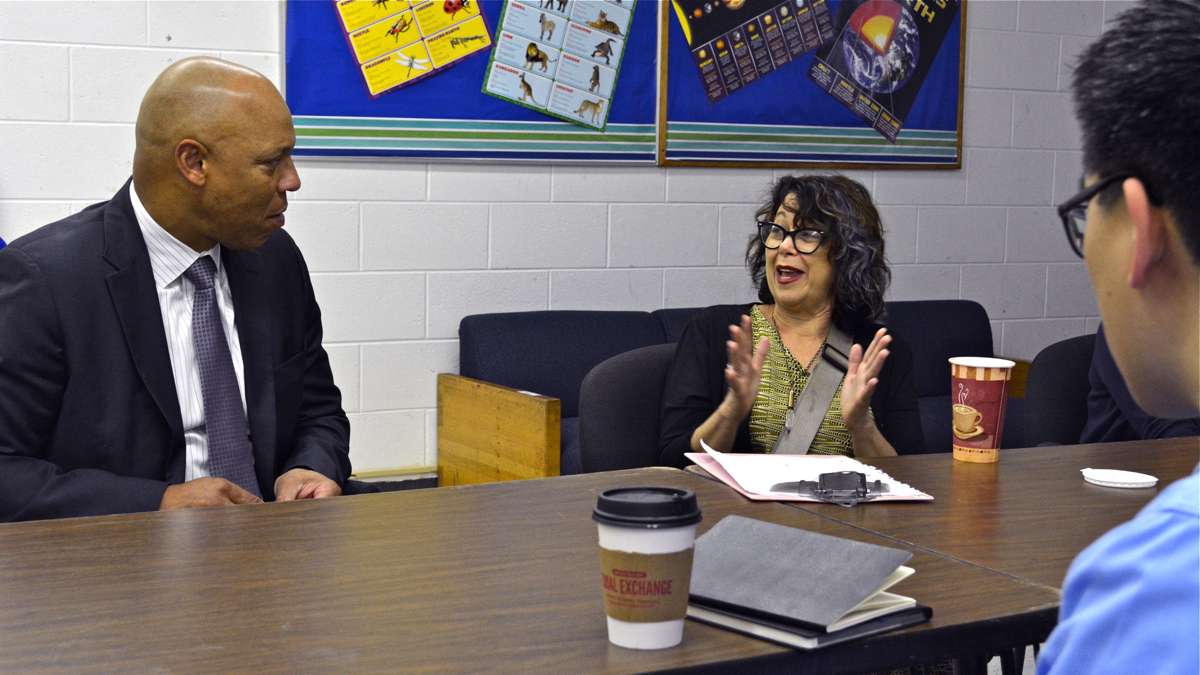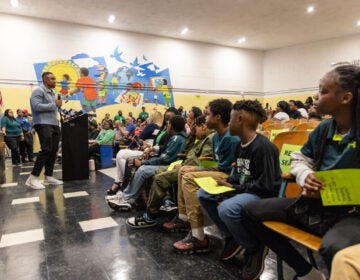First day of school in Philly inspires fears, hopes
ListenBen Franklin High School student Brian Burney arrived at school early on the first day of classes.
Before first bell, he joined a crowd of education activists gathered on North Broad street to raise awareness of the plight of Philadelphia public schools.
Call it civics in the streets, poli-sci on the sidewalk, communications on the corner.
“For most students, the buildings feel less like schools and more like jails,” he said over a small speaker, car horns beeping behind him in support. “I feel like we’re being treated like criminals because every morning, security and cops put our bags through X-ray machines, and we have to go through metal detectors and then be screened again with metal detector wands.”
Burney and the dozens of other protesters organized by the Philadelphia Coaliton Advocating for Public Schools decried the cuts to classroom spending that occurred as stimulus funding dried up at the beginning of Tom Corbett’s term as Pennsylvania governor.
“Instead of spending money on policing us, that money should be spent on more cleaning supplies, nurses and counselors,” said Burney, a member of the Philadelphia Student Union.
Despite months of intense advocacy for additional school funding, schools opened Monday with fewer resources than last year – when the shortage of guidance counselors, nurses and support staffers routinely made headlines.
This year, those deficiencies remain, in addition to further cuts to building maintenence, school police and special education.
The district’s current budget assumes state lawmakers will reach consensus on a $2-per-pack tax on cigarettes in Philadelphia when they return from summer break on Sept.15. If revenue collections do not begin by October, district officials say additional cuts and layoffs will be necessary.
Corbett supports passage of a stand-alone bill.
Although the measure bounced between the House and Senate this summer in a game of legislative pingpong, House Majority Leader Mike Turzai, R-Allegheny, has pledged swift approval.
As classes began Monday at Ben Franklin, a coalition of education advocates led by Public Citizens for Children and Youth began a daylong rally at Corbett’s Philadelphia headquarters on South Broad street.
Parents and politicians, including state Rep. Michelle Brownlee, D-Philadelphia, read letters written to the governor by students.
“‘We need to have a nurse in our school every day because some people get [bloody], and they need a nurse,'” Brownlee read. “These children tell the truth. We need nurses, we need counselors, we need secretaries. We need support for our teachers and our children.”
‘Hope and possibility’
Superintendent William Hite and Mayor Michael Nutter kicked off the start of classes at LINC (Learning in New Contexts), one of the district’s three new innovative, non-selective admission high schools. These are schools that reimagine the high school experience by focusing on competency-based objectives and project-based learning.
Hite clearly made this the center of his first day to draw media attention to what he sees as one of the district’s bright spots.
“You’re going to help the school district of Philadelphia in more ways than you think,” said Hite addressing LINC’s inaugural freshman class.
District leadership views the new schools as a model for internal research and development experimentation.
“This represents the hope and the possibility of what high schools can become here in Philadelphia,” Hite continued. “And I want to leave you with nothing else but to take advantage of this opportunity.”
Nutter doubled down on the idea. Although some find controversy in the idea of investing in innovation during times of widespread austerity, Nutter said it was necessary for the district’s survival to create new opportunities.
“Our superintendent, the School Reform Commission, they’re not slowing down. They’re not stopping. They’re not maintaining the status quo,” he said to the LINC students. “They’re actually still trying to do new things, innovative things, and build on some of the success that we’ve had. And we’re going to learn some things from what goes on in this school.”
The three new high schools drew widespread interest; 1,800 students joined a non-selective lottery for a little more than 300 spots.
Although LINC has received $1.5 million in start-up capital from the Carnegie Foundation, the school will suffer much the same dearth of resources as other schools this year. Principal Saliyah Cruz, however, said that can’t be an excuse for educators.
“Kids still have to learn, right? And so you have to figure out how to do that the best you can with the resources that you have,” she said. “I mean, we’re fortunate that we have additional grant resources to do things like buy technology. But, in lots of other ways, we have the same financial constraints as everyone else.”
During her opening-day speech to students in the school’s auditorium, Cruz avoided any reference to the funding crisis. Instead, she urged the freshmen to embrace the idea of making mistakes.
“The only way you really learn, the only way you really grow, is if you’re willing to try something that maybe you’re not so sure that you can do,” she said. Learning happens best, she said, when students “are not afraid to ask questions,” and when they “give other people the space to do that as well.”
Students at LINC radiated with freshman jitters and first-day shyness.
Many, though, echoed similar reasons for choosing the start-up school, praising LINC’s small community feel while lamenting the perceived chaos at their neighborhood high schools.
Lawncrest’s Samyr Lominy didn’t feel he’d fit into Fels or Northeast High.
His attraction to LINC was simple: “It’s new,” he said. “Less students, less drama.”
Najay Dixon finished middle school at Wakisha Charter last summer. For his family, Strawberry Mansion High wouldn’t do. If not for LINC, he would have enrolled in a charter. “I just hope I do better than last year,” he said.
Parent Bridgett Bailey-Fletcher likes that there’s no upperclassmen in the school yet.
“They get to concentrate on being 14,” she said. “That’s awesome.”
Despite funding shortfalls, Hite stressed that students can still make meaningful academic progress throughout the year. It’s important, though, that they consistently come to school.
“What we know is that children who attend school less than 95 percent of the time don’t do as well, and they don’t graduate,” Hite told a scrum of reporters in the LINC cafeteria. “We don’t want them missing more than 11 or 12 days of school.”
To prevent excessive absences, Hite said the district will be more proactive this year in reaching out to parents when students miss school. Parents will also get reports that show the attendance rates of other kids in their neighborhoods.
Good attendance was one of many goals voiced earlier in the day by incoming freshman Jahyad Thomas-Thorton on his first day of classes at Benjamin Franklin High.
Although he admits that he worries about the effects of the district’s bare-bones budget, he beamed at the thought of having a clean academic slate.
“I think I’m going to have everything together this year,” he said. “It feels like a good year.”
WHYY’s Holly Otterbein contributed to this report.
WHYY is your source for fact-based, in-depth journalism and information. As a nonprofit organization, we rely on financial support from readers like you. Please give today.




